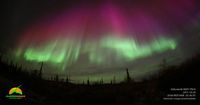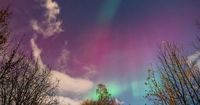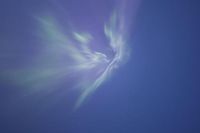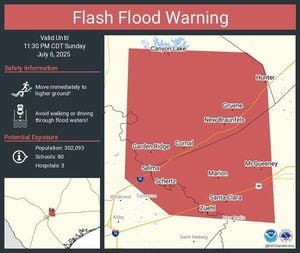Tonight may offer one of the last chances to witness the aurora borealis this season, as a powerful geomagnetic storm currently surrounds the Earth. A coronal mass ejection that erupted from the Sun three days ago is now bombarding Earth with a stream of energized solar wind. If conditions remain favorable, skywatchers could be treated to a breathtaking display of colorful, dynamic Northern Lights.
Astronomer Sævar Helgi Bragason—known to many as "Star-Sævar"—shared the news in a press release, encouraging everyone to keep an eye on the sky between 10:30 p.m. and shortly after midnight on April 17, 2025. He noted that while tonight may bring spectacular skies, the Northern Lights season in Iceland is drawing to a close due to lengthening daylight. As Star-Sævar points out, Iceland no longer experiences full darkness—an essential ingredient for spotting the auroras.
Fortunately, many parts of the country are currently enjoying ideal viewing conditions. The website icelandatnight.is provides real-time space weather data and cloud cover maps to help locate clear skies. Star-Sævar remarked, “Tonight could be the grand finale for now. But the best may still be ahead of us,” referring to the bright outlook for future aurora displays.
Meanwhile, the beauty of the aurora borealis could potentially be observed in the skies over Quebec tonight, as showers are forecasted to fill Montreal’s long weekend. Environment and Climate Change Canada announced clear skies and a low of 2°C, with a major geomagnetic storm watch in effect since April 15, 2025, continuing until 8:00 p.m. on April 17, 2025. Ejections of the Sun’s material were observed during April 12-13, 2025, and are expected to affect the Earth, resulting in disturbed geomagnetic conditions.
The northern lights are likely to be more visible in the northern part of Quebec and more difficult to observe in the south. As the weekend approaches, Montreal will experience a mix of sunshine and showers, with rain forecasted to carry over into the Easter long weekend.
In the United States, millions may also be in for a treat as the northern lights are expected to put on a dazzling display across over a dozen states. The National Oceanic and Atmospheric Administration's Space Weather Prediction Center (NOAA) suggests that Wednesday night, April 16, 2025, could be the prime time to witness this rare event.
The northern lights occur when charged particles from the sun collide with Earth's atmosphere, resulting in waves of glowing colors that light up the sky. NASA explains, “The Sun continuously produces an outflow of charged particles into the solar system known as the solar wind.” When the solar wind reaches Earth, it can interact with Earth's magnetic shield, often depositing and accumulating energy there. This energy is released, causing auroras.
Since mid-2024, a series of geomagnetic storms has allowed the auroras to be seen much farther south than usual. Remarkably, the phenomenon has been spotted as far south as Florida. This unusual visibility is attributed to the sun reaching its "solar maximum," the peak of its 11-year activity cycle.
According to NOAA, folks in Canada and the northern US have a chance to witness the aurora borealis tonight. The spectacle is expected to reach its peak on Wednesday, with the prime time to catch the northern lights typically falling between 10 p.m. and 2 a.m. local time. The most vibrant displays often happen an hour or two after midnight.
A total of 18 states could get a glimpse of the northern lights tonight, including Alaska, Montana, North Dakota, Minnesota, Wisconsin, Michigan, Maine, Washington, Idaho, Oregon, Vermont, New Hampshire, New York, Pennsylvania, South Dakota, Iowa, Illinois, and Nebraska. However, only four states might have the chance on Thursday, April 17, 2025.
For the best viewing experience, experts suggest moving away from city lights, although a bright moon could hinder visibility. As the aurora season winds down, enthusiasts are encouraged to take advantage of this rare opportunity. With solar activity expected to peak in the coming years, the likelihood of more dazzling shows in future seasons remains high.
As the skies darken tonight, both amateur and seasoned skywatchers will be looking up, hoping to catch a glimpse of the stunning natural light display. Whether in Iceland, Quebec, or the northern United States, the aurora borealis promises to be a captivating sight, reminding us of the beauty and power of nature.






